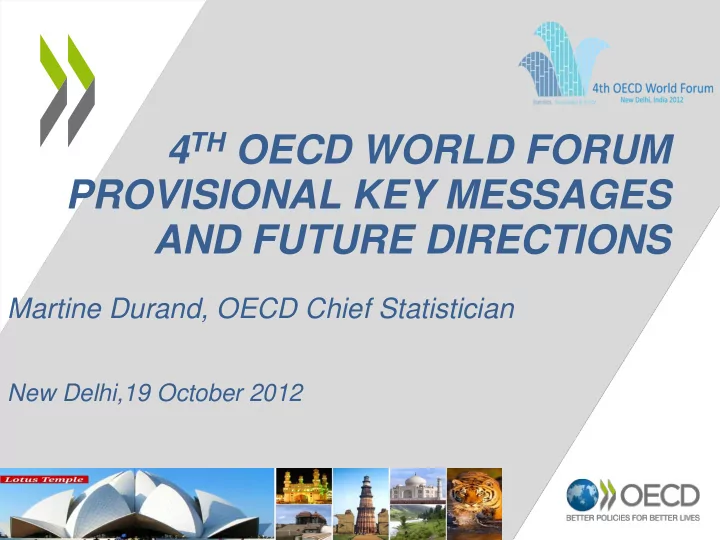

4 TH OECD WORLD FORUM PROVISIONAL KEY MESSAGES AND FUTURE DIRECTIONS Martine Durand, OECD Chief Statistician New Delhi,19 October 2012
Strong Momentum A large number of local, national, regional, and international initiatives • In all countries of the world: Australia, Bhutan, China, European Union, France, Italy, Japan, Korea, Mexico, Morocco, United Kingdom • At international level: OECD, UNDP , UN Regional Commissions • At regional and local levels • All levels of society
Convergence in our understanding of well-being A common understanding of the issue A common language for discussion A core set of similar well-being domains • with national priorities reflected in – domains – measures
Progress in measurement in some domains ... Material conditions – OECD Wealth Guidelines – Inequalities in Household National Accounts Quality of Life – OECD Guidelines on Subjective Well-being – UN Time Use Survey Guidelines and Classification – Washington/Budapest Groups on non-fatal health outcomes Environmental sustainability –SEEA (System of Economic and Environmental Accounting)
Challenges in others… Conceptual (and measurement) challenges in some areas – Governance – Social capital/social cohesion – Built environment and mobility Measurement challenges even where concepts are clearer – GDP and prices – Sustainability/Dynamics (here and now; there and then) – Social mobility – Mental health Timeliness
Level of analysis matters Spatial – Global – National – Regional – Local – City Population groups – Gender – Life course – Minorities
More research needed... “No cottage industry has developed to explain differences in performances in measuring other outcomes [than GDP]” – J. Stiglitz Need to think more deeply about causal mechanisms. Eg: “Structural models for linking outcomes with life course events and experiences” – R. Layard An international research agenda on this is crucial to moving from measurement to informing decision-making
...to promote change Creating awareness and knowledge Impact on behaviours and decision-making process Citizens and civil society New business models Policy-makers
Need for regular stocktaking… Measurement and research − Need for periodic assessment of where we stand and where progress is needed Policy – Sharing experiences on “what works” (e.g. Chile) – Frameworks for managing trade-offs and synergies (e.g. Bhutan) – Introducing well-being measures into cost-benefit analysis and program evaluation (e.g. United Kingdom Green Book)
...and continued consultation All actors in society must be involved –Legitimacy/ accountability –Quality of information Who are the actors? – Citizens – Civil society – Business sector – Organised labour – Academics (several disciplines must be involved) – Policy makers
A virtuous cycle Consultation Building Domains Knowledge Measures Promoting Change Analysis and research Informed citizens & New business Better policies civil society models Stocktaking and sharing experiences
What’s next? Upcoming international agenda on goals setting Bringing together well-being, the post-2015 development agenda and Sustainable Development Goals − Holistic approach to development − Goals, measures, and targets need to reflect this and country realities
What’s next (process)? This presentation will be posted for comments on www.oecdindia.in until 30 November 2012 and then released Summaries of individual sessions will be placed on the website and included in Forum proceedings The entire forum has been recorded and can be accessed on the website Joint concluding statement issued by OECD and Government of India Next OECD World Forum in 2015
Thank you and Farewell Thank you to – Government of India – Ministry of Statistics and Programme Implementation – Speakers – Delegates – Participants – The logistics team, interpreters and organisers See you all in 2015!
Recommend
More recommend